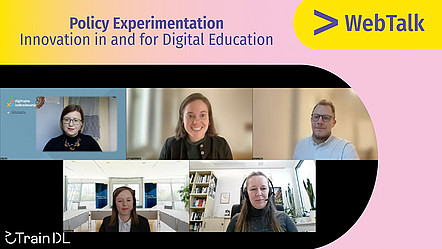How to… Policy Experimentation – The TrainDL WebTalk
For a WebTalk in the TrainDL project, four experts came together to present the topic of “Policy Experimentation” with exciting inputs and to discuss it from different perspectives.
Policy experimentation allows policy design supported by facts and evidence: In mid-April, the participants of the TrainDL web talk learned what this means in concrete terms: “First finding out what works for whom and under what circumstances is a good premise for designing political policies in a sound way,” said Johannes Müller, an expert in evidence-based social intervention and policy evaluation. In his introduction to the TrainDL WebTalk, he explained the research design of randomized experiments and drew parallels to medicine: similar to the procedure used there with experimental and control groups, policy experimentation tests the impact of policies in field trials.
Kathrin Herres, Erasmus+ Policy Support Officer at the DAAD, then talked about the funding of projects with a policy experimentation approach. Above all, she said, this centers around international cooperation and mutual learning between authorities. This exchange aims to enable innovation and change in the education system; which is especially needed in digital education.
In the following debate, the perspectives of the methodical expert and the DAAD were represented, as well as those of the Slovenian Ministry of Education and the TrainDL project itself. Particularly valuable for the speakers was the approach's focus on the impact of the planned measures. It reveals weaknesses in the measures and sometimes shows that they are not ineffective, but merely implemented incorrectly. Accordingly, Johannes Müller emphasized the importance of evaluating processes not just once, but on an ongoing basis, so that they can be improved continuously.
But even carefully devised project concepts can only be successful if the institutions involved are committed and open-minded, said Petra Bevek from the Slovenian Ministry of Education. For an institution like hers, the motivation to participate in a project would be to receive concrete recommendations and in turn contribute recommendations for others. “These international collaborations at the policy level or at different levels of education are like a breath of fresh air for us in the education system, with new ideas and new practices,” she said. “Through these collaborations, adjustments to current issues in the education system can be made more quickly while incorporating other perspectives. This is especially important in digital education issues.”
Interested in learning more? Click here to watch the recording of the full event with Johannes Müller, Kathrin Herres, Petra Bevek, Prof. Dr. Ulrike Lucke and moderator Elisabeth Schauermann.
Plans are already underway for the next TrainDL WebTalk; the topic will be how primary schools can master the teaching of competencies for artificial intelligence and data!

